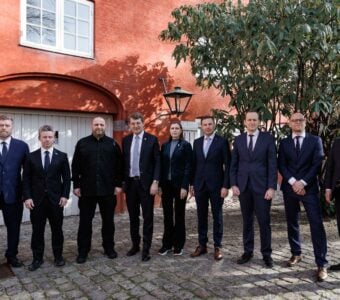Poland prolongs ban on grain imports from Ukraine

Photo: STEPHANIE LECOCK /PAP/EPA
Warsaw extended the ban on the import of Ukrainian agricultural products after September 15.
Prime Minister of Poland, Mateusz Morawiecki, reported this.
"The government protects Polish farmers! We will not open borders for Ukrainian grain! The embargo remains!" Morawiecki wrote.
Prime Minister of Ukraine Denys Shmyhal noted that Ukraine, despite the war and the blockade of ports by Russia, complies with its obligations under the Association Agreement with the EU and under the law of the World Trade Organization.
"We did not and do not intend to harm Polish farmers. We greatly appreciate the support from the Polish people and Polish families! But in case of violation of trade law in the interests of pre-election political populism, Ukraine will be forced to turn to WTO arbitration for compensation for damages for violation of GATT norms (General agreements on tariffs and trade – ed.)", he wrote.
For reference:
The All-Ukrainian Agrarian Council and agrarian associations, which are part of the "All-Ukrainian Agrarian Forum" and the "Union of Food Industry Producers of Ukraine" NGO, ask the Cabinet of Ministers to develop, together with representatives of the EU, mechanisms that would ensure the efficient operation of transit routes for Ukrainian agricultural products.
It is noted that in their appeal, the farmers call on the Ukrainian authorities, together with representatives of the EU member states, to develop mechanisms that would ensure the prompt, transparent, and efficient operation of transit routes for Ukrainian agricultural products.
"Over the past 18 months, Ukraine exported more than 85 million tons of agro-food products, of which about 32.5 million tons of products were exported by sea. Accordingly, during the same time, through the Solidarity Lanes (overland routes through Ukraine's neighboring states -members of the European Union), 50 million tons of Ukrainian agricultural and food products were exported. In these conditions, it is essential to expand the transit of Ukrainian agricultural products through our neighboring EU member states," the appeal reads.
Agrarians are stressing that, with the uncertainty surrounding the future of the Black Sea Grain Initiative, Ukrainian agriculture could be confined to the domestic market and excluded from international markets (in Africa, the Middle East, and Asia), which are increasingly being taken over by Russian influence and propaganda with the offer of "free grain."
Representatives of the Ukrainian agricultural sector condemn the introduction of any unilateral bans by European countries concerning Ukrainian products. Continuing the ban on importing agrarian products to five neighboring EU member states will negatively impact the Ukrainian agricultural sector. At the same time, the possible restriction of the transit of these crops through the territory of neighboring EU countries to third markets will cause catastrophic consequences for the sector.
"We support the development of free and open trade between Ukraine and its partners. At the same time, we ask you to pay maximum attention to the issue of ensuring effective transit. According to the export data of Solidarity Lanes, export volumes in August 2023 still did not reach the level of March of the same year. At the same time, we believe cooperation and partnership between Ukraine and the EU member states has great potential. Therefore, we emphasize the need to continue searching for constructive solutions regarding agricultural exports," the letter emphasizes.
The appeal is addressed to:
- Prime Minister of Ukraine Denys Shmyhal,
- First Deputy Prime Minister – Minister of Economy of Ukraine Yulia Svyridenko,
- Oleksandr Kubrakov, Minister of Community Development, Territories and Infrastructure of Ukraine,
- Olha Stefanishyna, Deputy Prime Minister for European and Euro-Atlantic Integration of Ukraine, and
- Minister of Agrarian Policy and Food of Ukraine Mykola Solskyi.
In May, the European Union allowed five countries bordering Ukraine to introduce a ban on selling Ukrainian wheat, corn, rapeseed, and sunflower seeds on the domestic market. At the same time, the transit of such goods is allowed for export to other countries. This ban was supposed to expire on September 15.
At the same time, at the beginning of September, Poland, Bulgaria, Hungary, Romania, and Slovakia advocated extending the ban on importing Ukrainian grain to these countries until the end of the year.

















































